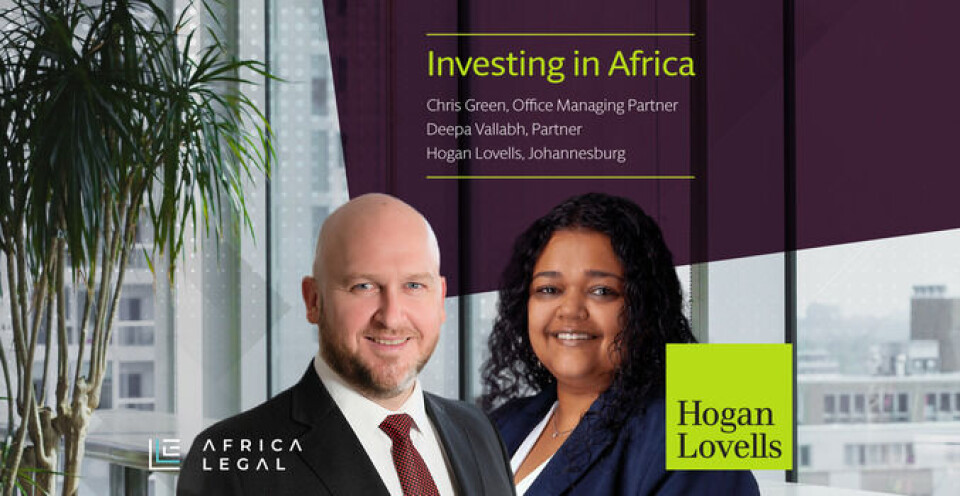When it comes to investment, Africa really needs to be doing it for Africa, with a greater focus on African nations helping each other to progress investment and increase development and infrastructure, says leading M&A and corporate finance expert Deepa Vallabh.
“We now have the African Continental Free Trade Area Agreement [AfCFTA], which is meant to facilitate better trade between countries in Africa and offer better terms for importing or exporting goods and services between the countries on the continent,” pointed out Vallabh, an experienced senior practitioner who joined Hogan Lovells as an M&A partner in February. “We now need to leverage that arrangement more seriously, and Africans and African businesses need to invest more on the continent.”
Along with breaking down trade barriers, AfCFTA should help share human capital and experience, says Vallabh, though she agrees there’s much work still to be done on implementation, common understanding and regulatory cooperation.
Vallabh was recently part of an expert panel for an Africa in Focus event, exploring how developing markets can capitalise on opportunities, and how Africa can mould itself into an attractive investment destination. The event covered a broad range of topics and perspectives, and highlighted challenges some of the speakers were facing around investments in Africa in their industries. These included regulatory uncertainty, currency fluctuation, difficulty of doing business and a lack of infrastructure.
“What was really important is that we had speakers who were big proponents of investment into Africa,” she said. “There’s a need to be more creative in terms of how deals are executed, and to engage with governments on issues as opposed to waiting for laws that are going to regulate an industry to come into effect.”
One of the key aspects of giving foreign investors some level of comfort, noted Vallabh, is being able to navigate the local environment from a practical perspective, as opposed to seeking legislative certainty before investing.
“Where African markets can create and foster an environment where development finance institutions (DFI) are comfortable to commit capital to projects and other investments in those markets, this will play a significant role in enhancing sentiment amongst other corporate and strategic investors with respect to those jurisdictions,” added Chris Green, Hogan Lovells’ Johannesburg Office Managing Partner and head of Corporate M&A. “DFIs rarely invest on their own, but typically act as catalysts, encouraging and bringing along private sector lenders and investors, including recently also private equity and debt funds.”
Hogan Lovells enjoys deep relationships with most, if not all, of the major DFIs globally, said Green. “Our hub offices, including those in Washington DC, London, Paris and Frankfurt ensure that we are well positioned relative to key senior decision makers at these institutions, and our global reach and footprint ensures that we are able to draw on teams in almost any location to provide a seamless service to DFIs looking to deploy capital,” he shared.
“Most recently, we worked with the International Finance Corporation, the largest globally acting DFI, on a significant equity investment into West Indian Ocean Cable Company Holding, a leading digital connectivity and infrastructure provider in Africa, and we are presently advising the IFC and Proparco (the French development bank) on a large mixed-use real estate development in Rwanda. We also recently advised FMO (the Dutch development bank) in relation to investments into Merensky Timber, one of the leading integrated plantation and processing groups of companies in Africa, and Commercial Cold Holdings Limited, a South-African cold storage platform with a pan-African expansion strategy.”
Thomas Hechl, the head of Hogan Lovells’ Africa Finance Practice, and the firm’s co-relationship partner for IFC, DFC (the US Government development lender), FMO and DEG (the German development bank) is now resident in their Johannesburg office and focusing on Africa-related DFI work.
Green says conversations such as those at the recent Africa in Focus event allow them to understand and contextualise the challenges that their clients face and collaborate with them to identify and implement innovative solutions.
“This particular conversation provided deep insights into the challenges faced by our global clients when they make investment decisions across the African continent,” he explained. “It also highlighted the opportunities that are available to global investors who face strong headwinds in developed markets as a result of the current geopolitical challenges, particularly with respect to sources of supply of key commodities and global supply chains. Facilitating these discussions and forums of this nature is, in our view, central to our strategic imperative of putting our clients at the centre of everything we do.”
To join Africa Legal's mailing list please click here

